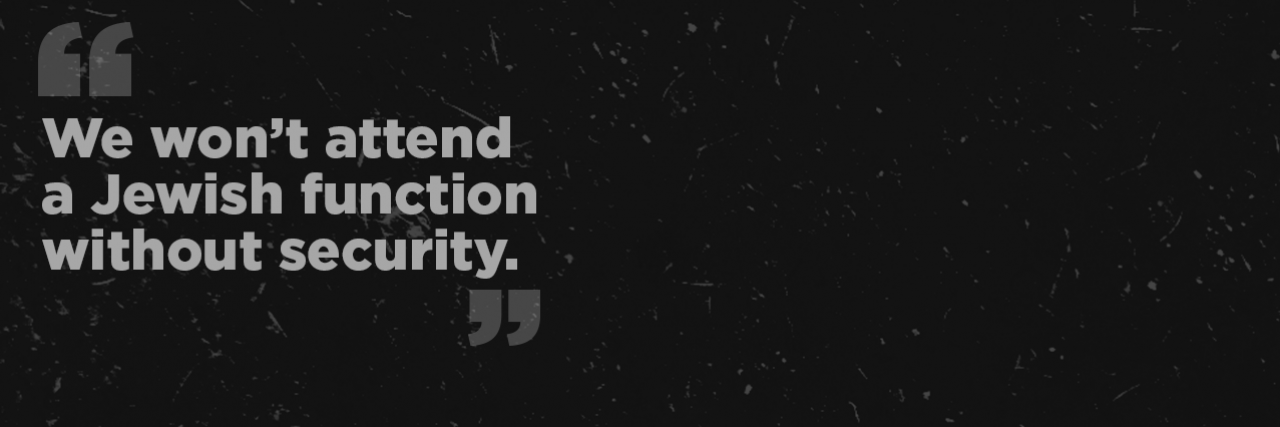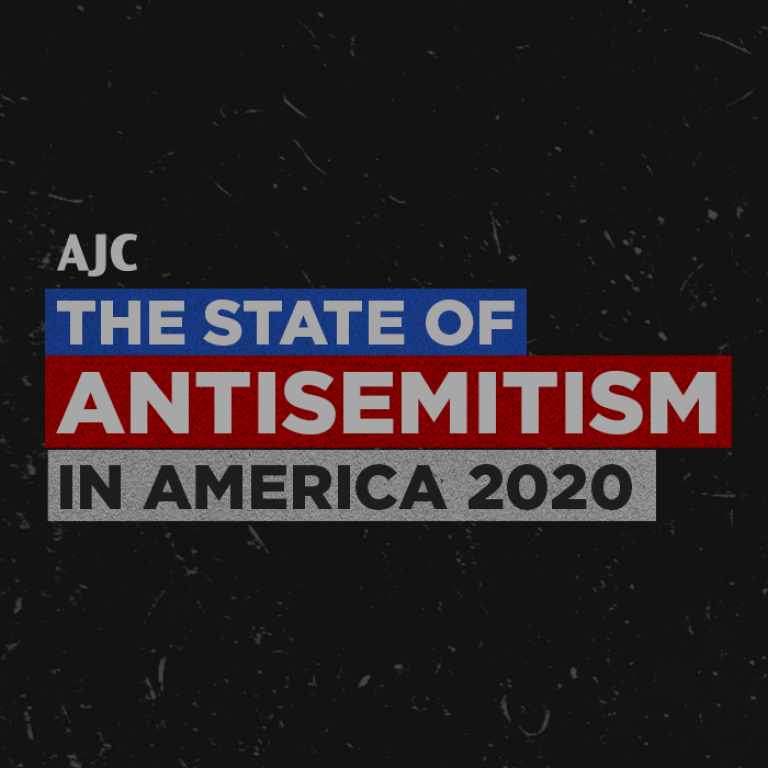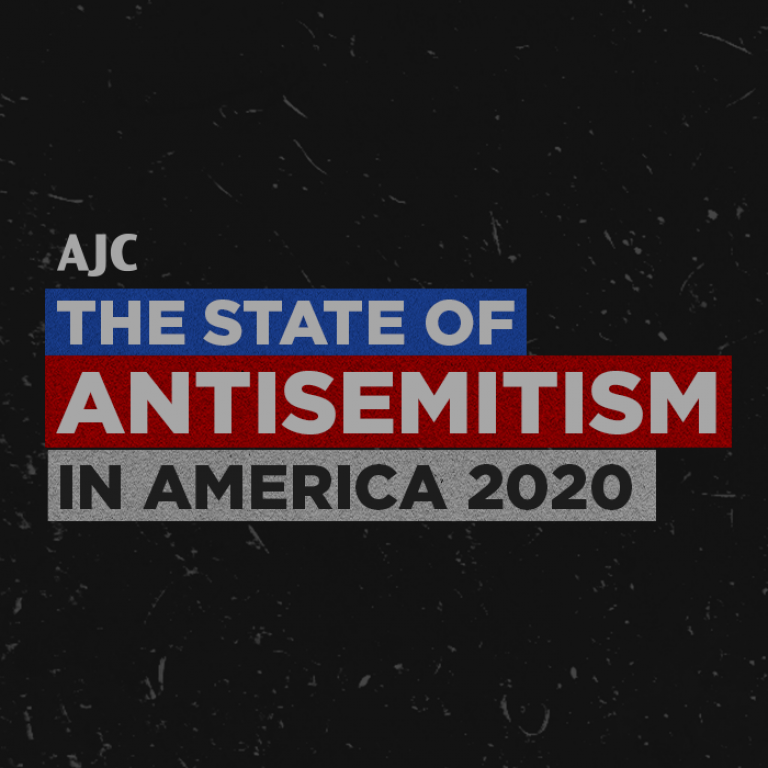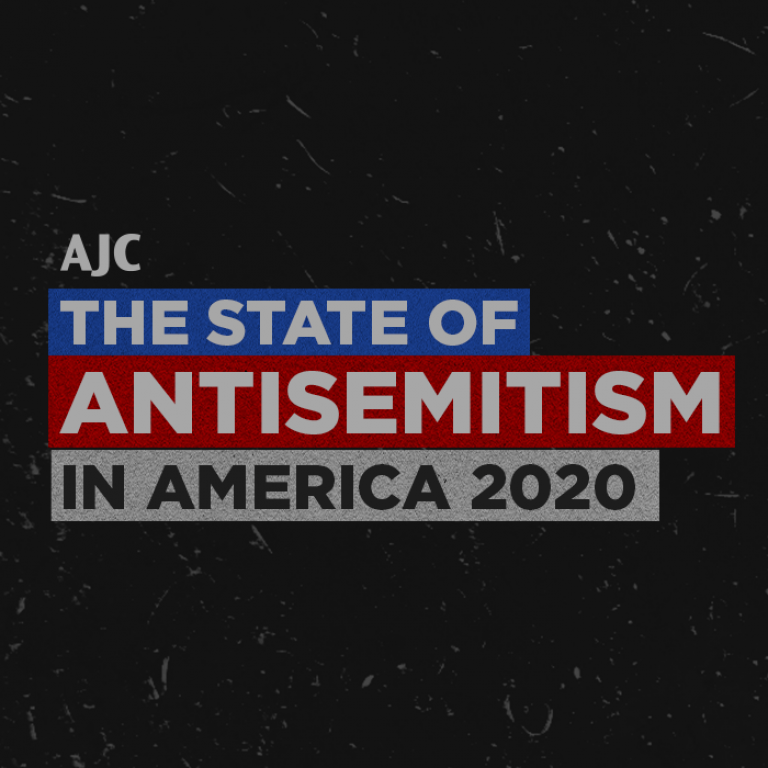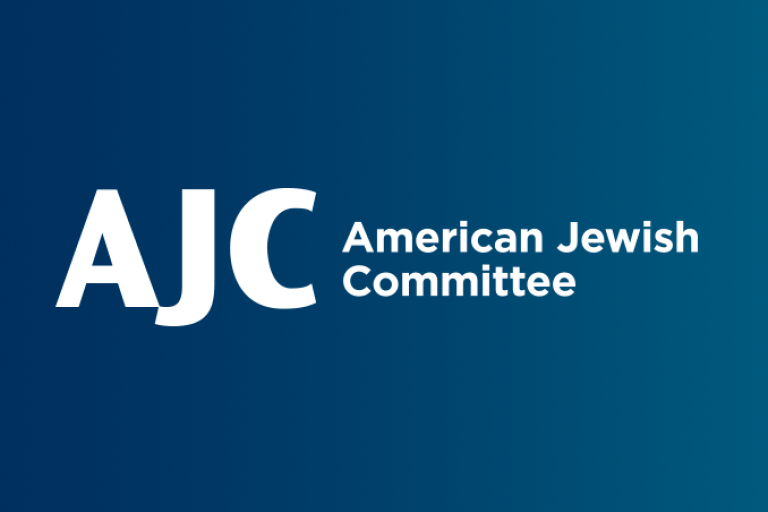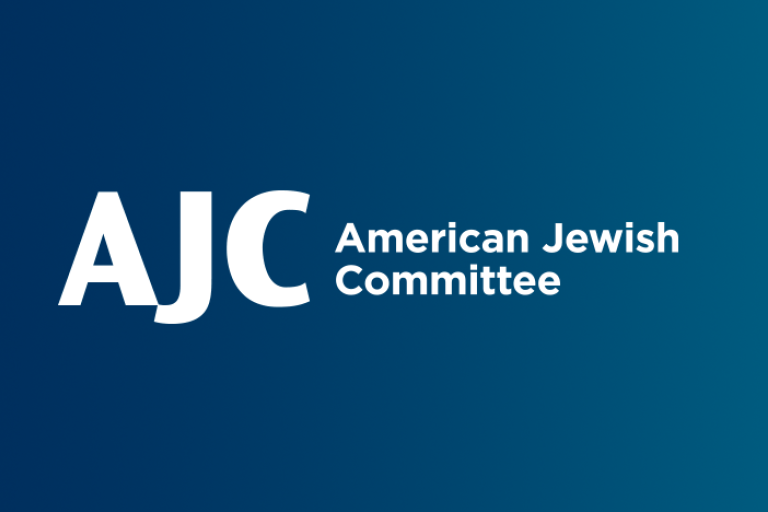October 30, 2020
In January, a string of brutal attacks against Orthodox Jews in their own Brooklyn neighborhood put the American Jewish community on edge. But the angst only got worse. By March, the coronavirus pandemic had sparked the spread of antisemitic conspiracy theories that Jews were responsible for spreading the virus.
AJC’s first-ever State of Antisemitism in America Report, released on October 26, 2020, found that 82% of American Jews concur – hatred against them has been on the rise. But it also found that only 43% of the American public agree.
The numbers speak for themselves. More than one in three American Jews (37%) say they have been the victims of antisemitism over the past five years, including a quarter who say they have encountered antisemitic remarks in person, by mail, or by phone; over a fifth (22%) who have been targeted by antisemitic remarks online or through social media; and 3% who have been physically assaulted for being Jewish. More than one in four American Jews say their institutions have been targets of antisemitism.
But the concerns of American Jews, as expressed in their own words, are just as telling. In the wake of antisemitic attacks in New York, New Jersey, Pittsburgh, and Poway over the past two years, many fear simply walking down the street, entering a supermarket, or answering a knock at the door. Here are some of the stories that give voice to the report’s findings.
According to the AJC report, 31% of American Jews say they avoid certain places, events, or situations out of concern for their safety. More than 56% of American Jews say their Jewish institutions have upgraded security since the Pittsburgh synagogue attacks.
Since April, antisemitic slurs, swastikas, and hateful messages have appeared on two synagogues in Sarasota, Florida, and antisemitic flyers have been found fluttering on parked cars all around the city.
That’s why, when Wendy Feinstein prepares to attend any Jewish event in Sarasota, she always does her homework to make sure it’s safe.
“We research ahead of time and make phone calls to make sure that security will be present at any Jewish event we are thinking of attending,” said Feinstein, a board member for AJC West Coast Florida. “We won’t attend a Jewish function without security.”
In the AJC report, one quarter of Jews said they avoid publicly wearing or displaying things that might identify them as Jewish.
When Samantha Marks walks down the streets of Chicago, she tucks her Star of David necklace inside her shirt. Her fiancé removes his kippah and puts it in his pocket.
“In the current climate and in general, you don’t want the wrong person to see you,” said Marks, a co-chair of AJC’s ACCESS young leadership program in Chicago.
Nearly half of the general public said they are either unfamiliar with the term ‘antisemitism’ or are unsure what it means. When asked, though, if a Jewish person or organization’s belief that a statement or idea was antisemitic would cause them to agree, 65% said it wouldn’t change their mind.
Sofia Bork, a practicing Roman Catholic, recalls hearing an offhand remark at a meeting about Jews being “Jesus Killers.” Bork spoke up and explained how hurtful those kinds of comments can be to Jews.
Bork, Chair of the Inter-Ethnic Committee at AJC ACCESS Atlanta, credits AJC and its resources such as Translate Hate, a glossary of antisemitic terms, for teaching her how to avoid similar missteps.
“I’m not sure I would have recognized ‘Jews killed Jesus’ as antisemitic without resources like Translate Hate,” she said.
The AJC survey found that 22% of the American Jews surveyed had been targeted by antisemitic remarks on social media in the past five years – including 62% on Facebook and 33% on Twitter.
Of those who reported the incident to the social media platforms, nearly half said the companies did not take steps to address it.
Deborah K. can’t stand seeing the Jew hatred that saturates social media. Still, she tweets almost daily.
“Antisemitism on Twitter is horrible,” she said. “I stay to fight it, and I've connected with many people who are a support system.”
A former university professor, she’s also troubled by the emergence of antisemitic groups on college campuses. More than one in five American Jews said they or someone they know experienced antisemitism on a college campus.
“Students are so vulnerable. I want to help,” she said.
One in three American Jews reported being a target of antisemitism in the past five years.
Denyse S. of California will never forget the evening before the High Holidays began in 2016, when a maintenance man from her apartment complex knocked on the door just before sunset. She had needed someone to light her heater for quite some time.
Yet, despite the frigid temperature outside, the repairman wore a sleeveless shirt that revealed a 4-inch swastika inked on his forearm. After noticing her alarm, he looked her in the eye and sounded out the word: swas-tee-kah. She chased him out of her home.
Of those targeted by antisemitism, 76% did not report the incident to authorities, journalists, social media, or Jewish organizations.
AJC New England Board member Cynthia Marcus says the adage “Be Jewish, but be quiet” has been a sad reality for many Jews in America for too long. She strongly believes that, “when injustice is happening to Jews, we have to yell it from the rooftop. It is our responsibility for everyone to stand up.”
Marcus, who grew up in Sherbrook, Quebec, remembers being told at the age of 5: “You killed our Jesus!” She also recalls learning early on the meaning of the slur “Jew down.”
“I have always been concerned with antisemitism, but never surprised,” Marcus said. “I have spent time looking over my shoulder. You don’t want to be too obvious as a Jew in America.”
According to the report, 89% of American Jews consider the extreme political right an antisemitic threat; 61% consider the extreme political left a threat.
In December, vandals broke into the Nessah Synagogue in Beverly Hills, California, which is home to the largest Persian Jewish community in the United States. The intruders shattered windows, destroyed prayer books, tore prayer shawls, and defiled two sacred Torah scrolls.
In recent months, more synagogues have been defaced and vandalized during riots after the murder of George Floyd. Los Angeles commuters also were shaken by a banner strung across the 405 Freeway by a right-wing extremist group proclaiming, “The Jews want a race war.”
“The majority of Jews in Los Angeles are in a heightened alert of antisemitism from both the right and the left,” said Richard Hirschhaut of AJC Los Angeles, “and with that understanding, there is a resolution and defiance not to be intimidated.”
Regarding the anti-Israel Boycott, Divestment, and Sanctions (BDS) Movement, 37% of American Jews believe it is mostly antisemitic. Another 43% believe it has some antisemitic supporters. 43% of American Jewish young people between the ages of 18 and 29 have experienced antisemitism on a college campus and/or know someone who has.
Margo Dickstein, a student at the University of Michigan, expressed concern about the safety of Jews on her campus, which has experienced intense BDS activity.
When, a few years ago, the university’s student government hosted an outdoors hearing on a BDS resolution to accommodate more people, Dickstein and other opponents suddenly found themselves encircled, surrounded, and endangered.
“Sometimes, you do feel unsafe,” she said.
